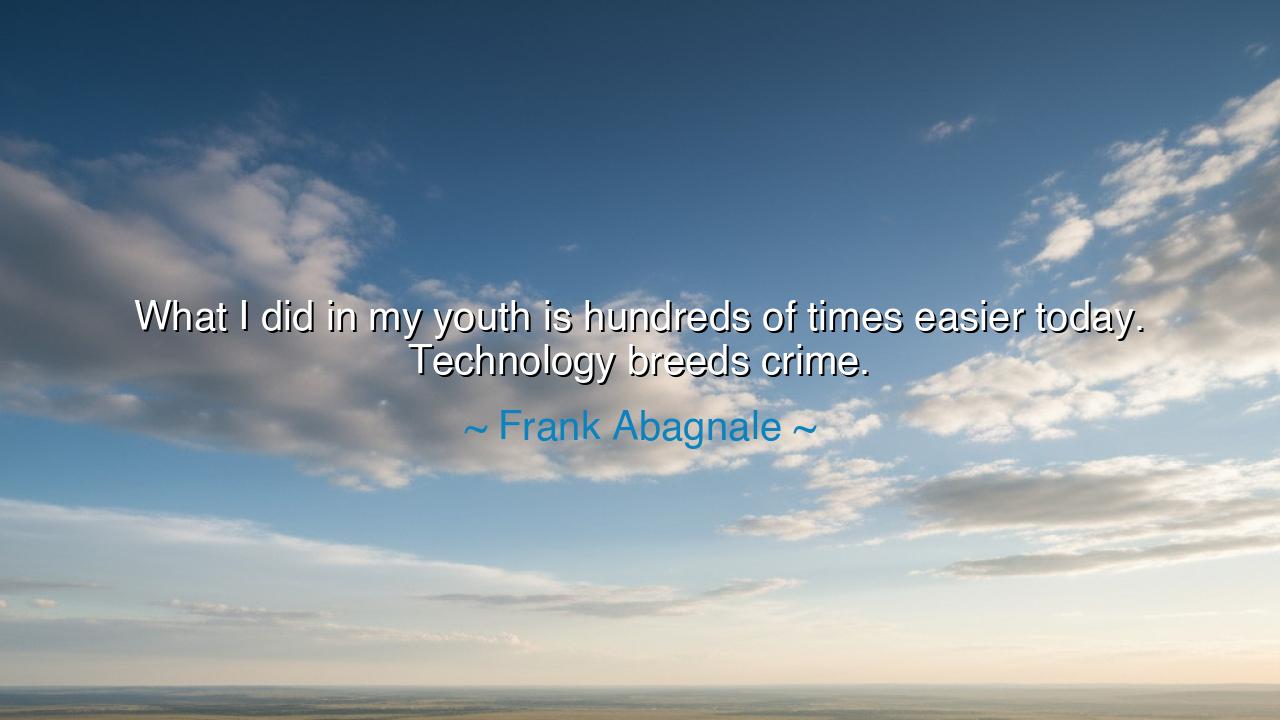
What I did in my youth is hundreds of times easier today.






Hear now the words of Frank Abagnale, once the master of deception and later the herald of truth, who proclaimed with sobering clarity: “What I did in my youth is hundreds of times easier today. Technology breeds crime.” These words, forged from the experience of a life that walked both in shadow and in light, are not spoken lightly. They are both confession and warning, a message to those who would listen that the very tools which empower us also open the gates to danger.
Abagnale speaks first from his own story. In his youth, he became infamous for the daring crimes that inspired awe and fear alike. He forged checks, assumed false identities, and moved through the world with cunning so remarkable that he deceived banks, airlines, and governments. Yet even in those days, every false document demanded careful craft, every ruse required immense labor. Now, with the rise of technology, what once took days of toil can be done with a few keystrokes. The effort has diminished, but the peril has multiplied.
Consider the meaning of his words: technology breeds crime. This is not to say that technology is evil, for it is but a tool, as fire is a tool. Fire can warm the home, but it can also consume the village. So it is with modern inventions—computers, networks, digital codes. They have given mankind miracles undreamed of: instant communication, vast libraries of knowledge, connections that span the earth. Yet in these same channels lie pathways for fraud, theft, and destruction. The very abundance of opportunity creates abundance of temptation.
History bears witness to this truth. When the printing press was invented, it brought forth the glory of knowledge, but it also gave rise to counterfeiters who used the new craft to forge money and documents. When the telegraph was born, it shrank distances, but also invited swindlers who tapped lines and intercepted secrets. Every new technology has carried with it both the blessing of progress and the shadow of crime. Abagnale’s words echo this eternal pattern, but in our age, the shadow grows long indeed.
Yet his words are not despair, but counsel. For though crime may breed from technology, so too may defense. The same tools that make deception easier also create ways to expose it. Encryption guards what once lay vulnerable; surveillance unmasks what once was hidden; and awareness can shield the unwary. The struggle is not against technology itself, but against our failure to wield it wisely. The fault lies not in the tool, but in the human heart, which must choose whether to build or to destroy.
The lesson is clear: do not be lulled into carelessness by the convenience of the modern world. Where once effort was a barrier, now simplicity opens doors for both good and evil alike. Guard your information as the ancients guarded their treasures. Live with vigilance, as the sentries once watched the city gates through the long night. And above all, teach the young not only how to use technology, but how to respect its dangers, lest they stumble into folly.
Practical steps await you. Protect your identity as you would your honor. Question what seems too easy or too perfect. Support laws and practices that secure the tools of the digital age, but do not rely on them alone—wisdom and prudence remain the strongest shields. And remember this: just as Abagnale turned from deception to truth, so too can our society turn from peril to safety, if only we wield the gifts of technology not as instruments of crime, but as instruments of justice.






AAdministratorAdministrator
Welcome, honored guests. Please leave a comment, we will respond soon